
Solar panel image Stocksnap
Many solar panel and some inverter models have been removed from the Clean Energy Council Approved Products Lists this year – and the CEC has again warned installers not to get caught out.
In order for solar power systems to be eligible for STCs, which form the basis of Australia’s major solar subsidy, panels and inverters used in an installation must be present on the relevant Approved Products List (panels here, inverters here) at the time of installation.
A stack of modules were removed earlier this year when product standard changes came into force, including new versions of IEC 61215 and IEC 61730, and many panel listings expired. The February culling saw 3,600 solar panels removed from the list.
The CEC boosting its testing and compliance program for solar panels and inverters also saw 16 companies and 488 models being suspended or de-listed in 2017. So far this year, eight companies and 156 models have been either suspended or de-listed.
“In addition, the results from the inverter tested under the Inverter Test Program are starting to come in,” said Clean Energy Council Executive General Manager, Installation Integrity Sandy Atkins. “Two inverters have failed anti-islanding tests and have been removed from the approved inverter list.”
The inverters Mr. Atkins refers to we mentioned in February and are manufactured by Shenzhen Sofarsolar (Mass Energy) and Shenzhen JingFuYuan Tech (JFY). JFY has since appealed the delisting decision and the appeal was denied.
The advice concerning these inverters remains the same at this point: a) don’t install them, b) if they have been installed, suppliers should be contacted and installers should await advice from the manufacturer or electrical safety authorities on action to take (such advice is yet to materialise).
Consumers Should Be Proactive
As a proactive measure, it doesn’t hurt for households and businesses awaiting installation or going through the quoting process to also check to see if the components they’ve been quoted on are present on the lists. While it’s the installation company’s responsibility to do so, an ounce of prevention is often better than a pound of cure.
The CEC’s increased focused on testing and compliance may have caused it to be the target of vitriol at times, but Australians going solar can be more assured that as a result of these efforts what is being put on their rooftops and mounted on their walls will be safe and stand the test of time – and that’s good for everybody.
The Council’s activities are also sending a clear message to manufacturers and importers – that messing with the CEC on compliance will end badly. With the CEC now also publicly announcing de-listings, it can have a bigger impact on how that brand is viewed in Australia; and for a longer time.
On a related note, if you’re interested in learning more about panel or inverter brands that have a good track record here in Australia, check out Finn’s article on solar brands you can trust.

 RSS - Posts
RSS - Posts



Had a solar unit installed by Ash P. He failed to put paper work into Energex.
Now he claims, “The inverter is not CEC approved and something that yourself as the home owner could have also checked. I am trying to help you Lonnie, however this was an air tasker job to JUST install your equipment, which was carried out to industry standard.”
I did not just ask him to install the equipment, he connected it to the grid, but does not want to know about it.
Where can i get help to sort out the inverter used was a Growwatt 4.2 kW? Now he tells me that is not up-to-date with the ones allowed to be used. I am fed up with the rip of solartecs out there they want to milk you dry cash wise. No follow up service.
Goodlife Solar screwed me over on the main system. Closed down and opened up as a another firm in 2019! Ash P off air tasker is ignoring the fact Energex states it is his matter to sort in emails he tells me it is up to me.
Doesn’t sound like a great experience, Lonnie! One of our SolarQuotes “Repairs and Maintenance” installers would be able to help you if you fill in your details in our form.
Your story is also a lesson to ensure that you have a reputable installer whenever doing anything solar-related! Best of luck.